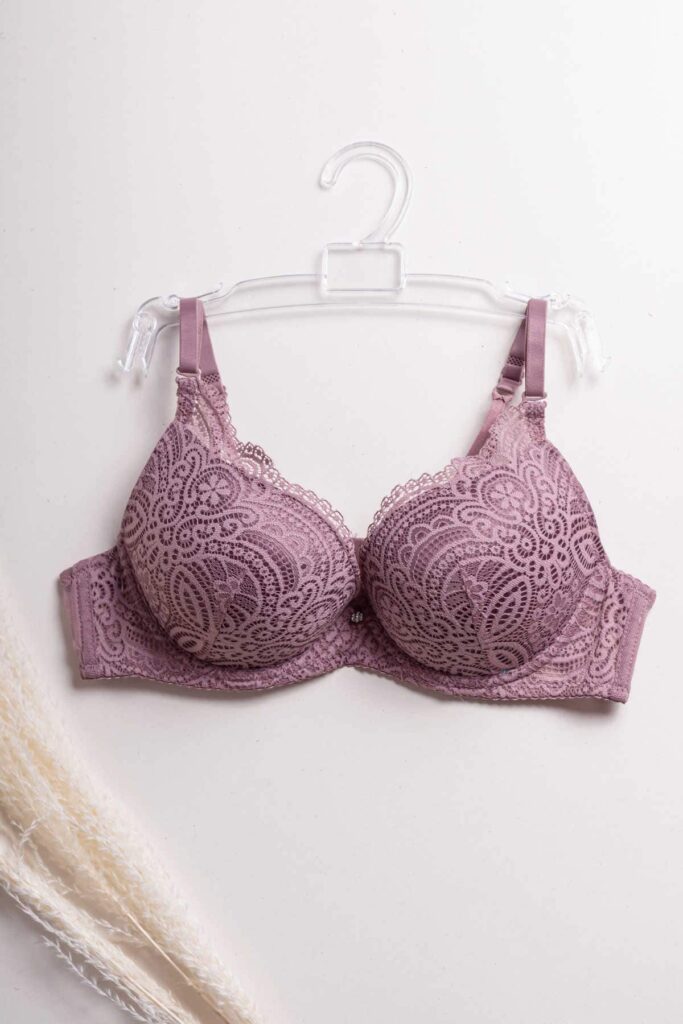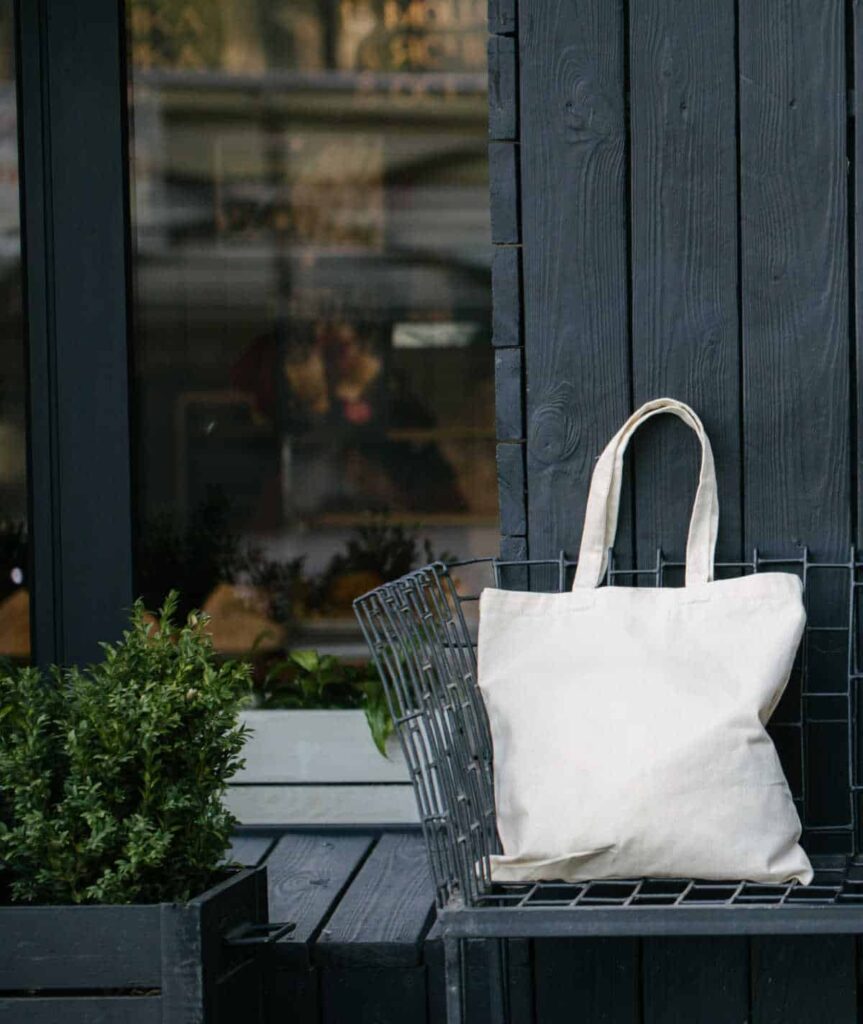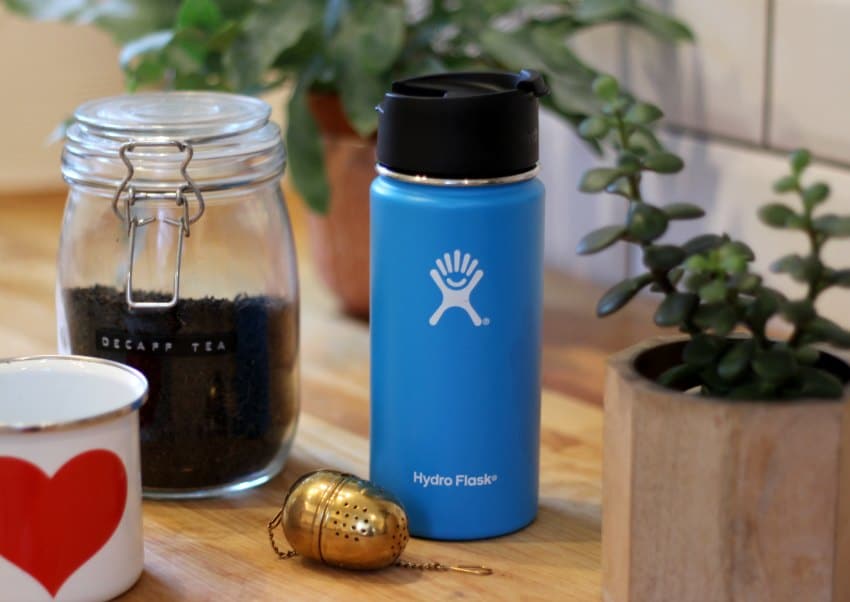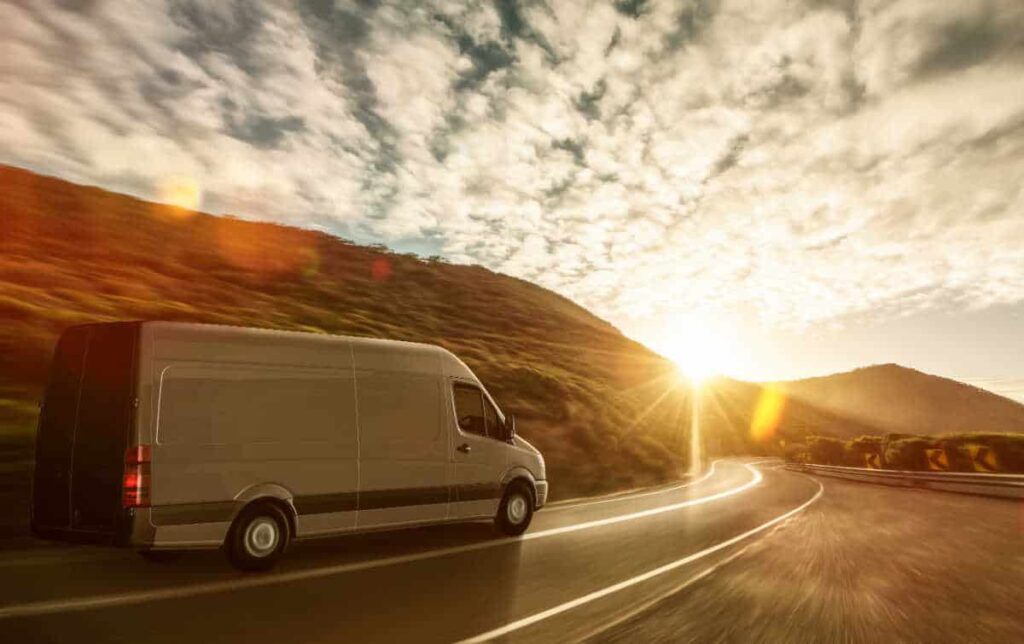Top Ten Green Parenting Tips To Raise An Eco Baby
To support the running costs of Moral Fibres, this post may contain affiliate links. This means Moral Fibres may earn a small commission, at no extra cost to readers, on items purchased through these links.
Looking for some green parenting tips? Here are my best tips to help you raise an eco-baby, with zero judgement.
As a mum of two, I know only too well the impact that having a baby – especially your first baby – has a way of making you think more deeply about the state of the planet. It’s really no coincidence that I started Moral Fibres when my eldest daughter turned one. After all, it’s only natural to want to ensure that your children have clean air to breathe, clean water to drink, and a safe environment to grow up and thrive in.
If you’re feeling the same sense of environmental responsibility, then it can feel totally overwhelming knowing where to start with green parenting. After all, if you’re reading this then you probably have a new small person to look after and the learning curve that comes with that, I know, is huge. Time and energy are scarce before you even factor in the impact of sleep deprivation on your ability to make decisions.
When my daughter was born, we started making small but meaningful incremental changes to our lifestyle. So to make things easy for you, I wanted to share the tried and tested things that worked for us, that might work for you too.
My Top Green Parenting Tips
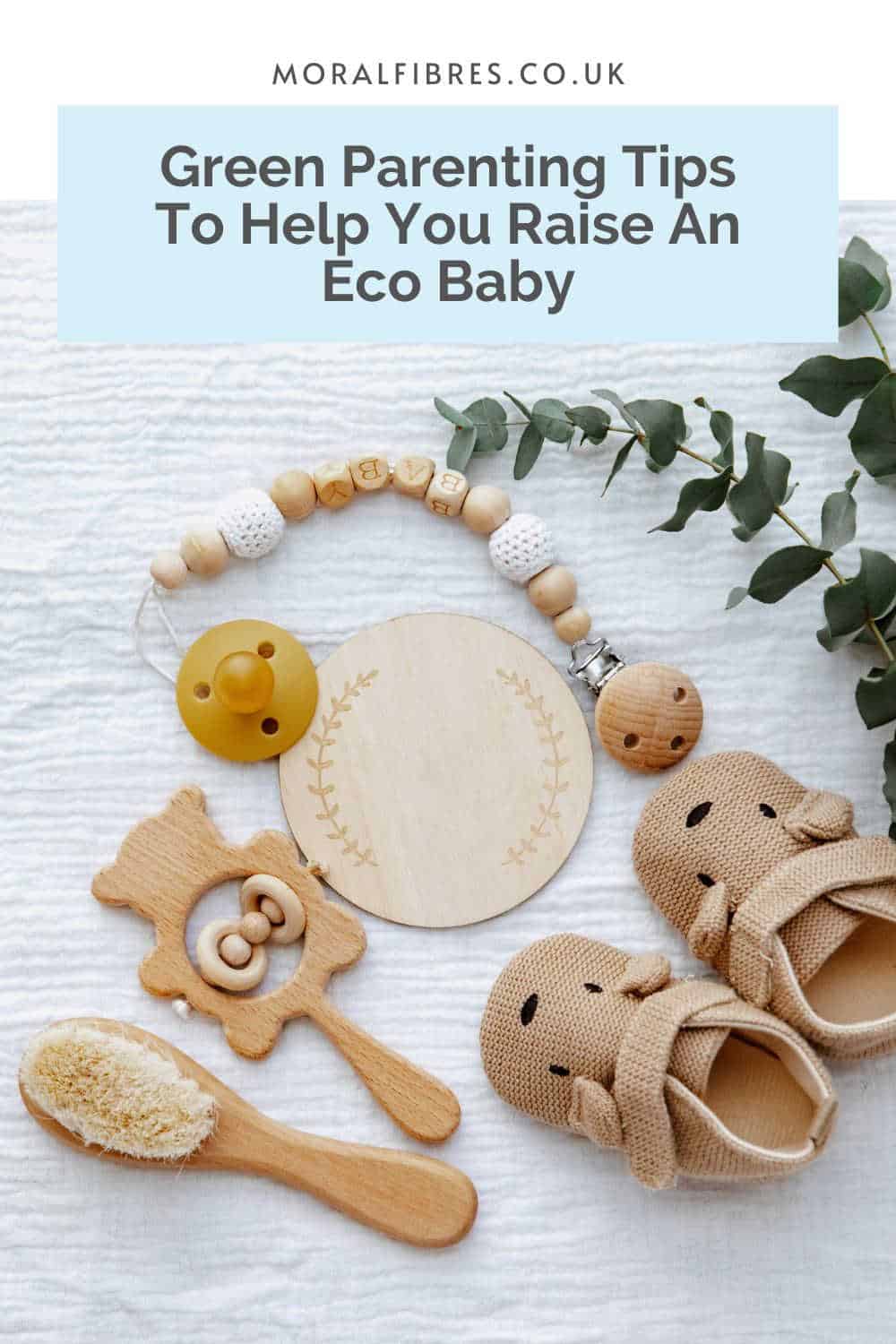
Before I get into my green tips, I first want to acknowledge that it is so hard being a parent. Sometimes it feels that others are judging you on your parenting decisions.
Breast vs. bottle; dummy vs. non-dummy; the list is never-ending. So the last thing I’d want is for you to feel like you’re being judged just because your kid wears disposable nappies (mine did too sometimes) or drinks formula. That is not what Moral Fibres is about. The single most important thing I’ve learned about being a parent is that you have to do whatever works for you and your baby.
As such, my green parenting tips are by no means prescriptive. These things work for us. Maybe some of them might work for you too, but if they don’t then that’s ok! Sustainability doesn’t look the same for everyone, and it’s important for you to find your own path.
As your time is at a premium, use the quick links to jump to a specific section or keep scrolling for the full list of tips:
- Embrace The Joy of Preloved
- Opt For Reusable Nappies If Possible
- Try Reusable Wipes
- Adopt Eco-Friendly Laundry Practices
- Try Green Cleaning
- Try Swapping To Sustainable Baby Products
- Ditch The Car Where Possible
- Eat Less Meat
- Embrace Your Local Library
- Try Toy Swapping
1. Embrace The Joy Of Preloved
The first of my green parenting tips is to embrace the joy of preloved.
When I was pregnant a friend gave me a load of her old maternity clothes. This was a total lifesaver, because who wants to buy new clothes that you can only wear for a few months? Other friends gave us their Moses basket, a pram, steriliser, sheets, and toys they no longer had any need for. My sister gave us a massive bag of baby clothes from zero months to age three that my niece had long since grown out of.
One of the very few things we did buy new was a car seat. This is because the NHS recommends that you do not buy or use a second-hand car seat as you can’t be certain it was involved in an accident. The damage may not be visible, but the impact may have impacted its integrity, so it’s better to be safe.
Our cot was also new (we had a Boori cot – which I really rated), but it’s easy to pick up cots secondhand. However, do note that The Lullaby Trust recommends buying a new mattress due to potential health risks.
We were amazed and so grateful for all of the help and items given to us. Babies grow so fast. And for the first year especially, babies grow out of their clothes in months. They get through five sizes of clothing in the first year alone, so it just makes good environmental and financial sense to choose preloved.
If you don’t have any friends or family with older babies/toddlers/kids then take a look at charity shops, eBay, Facebook Marketplace, Freecycle, and the freebies section of Gumtree. You’ll be surprised at what you can find on there!
2. Opt For Reusable Nappies If Possible
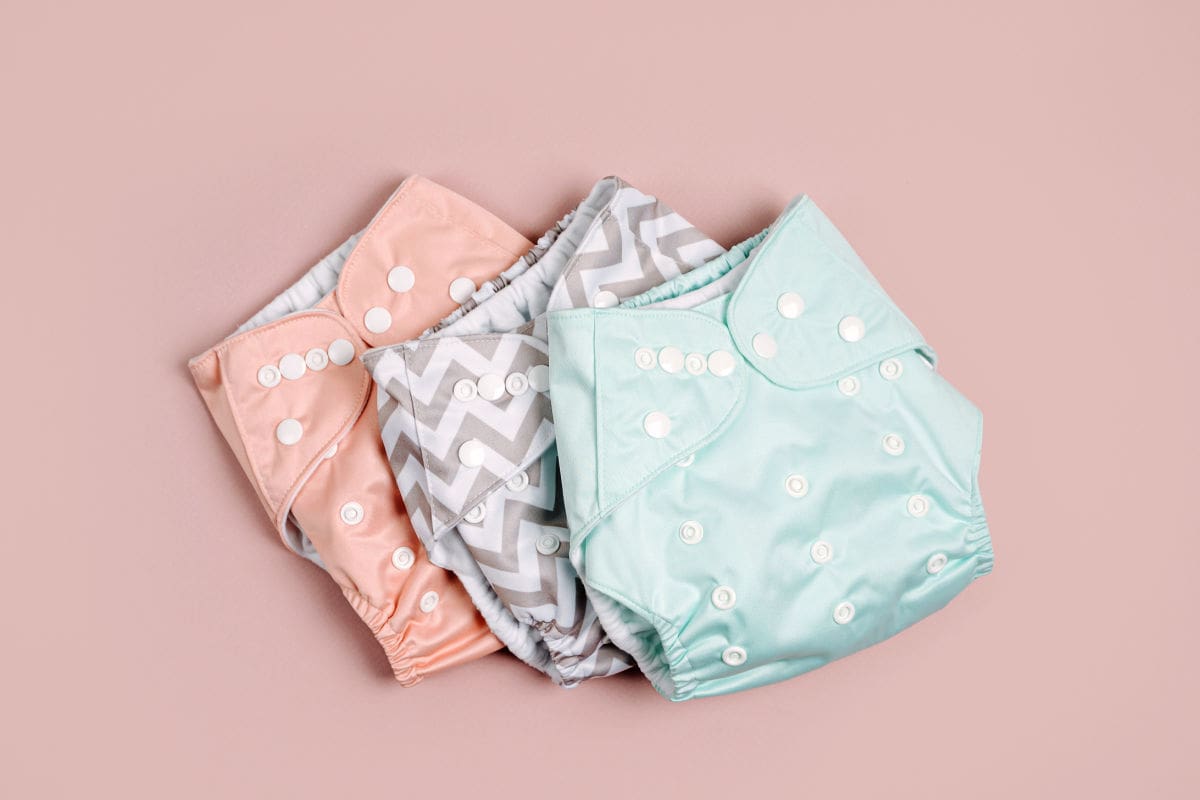
My next green parenting tip is to give reusable nappies a go if you can. We used washable nappies on my two daughters. And even when we went through potty training I used washable training pants.
Reusables are good for the environment – you’re not sending anything to landfill with each nappy change. And I loved using washable nappies. It wasn’t a hassle in the slightest. It was just a case of putting everything in the washing machine and then hanging it up to dry.
There were no late-night dashes in the rain to the shops to buy nappies because we’d run out. No carrying home bulky packs of nappies. And definitely no stinky bins full of discarded nappies. We just put a wash on every time we started to run low. So convenient!
One of the main drawbacks of reusable nappies is the upfront cost. We spent £200 on washable nappies because at the time (2012) the market was quite new and it was tricky to find preloved ones. If you can afford the upfront cost, then you do end up saving a heap of money. This is because buying disposable nappies and disposable training pants for at least two and a half years soon adds up, especially if you have more than one child.
A cheaper, more accessible option is buying nappies secondhand from Facebook selling groups. The washable nappy scene exploded in 2020. Because of this, a few years on, it’s so cheap and easy to pick up preloved reusable nappies that have barely been worn.
3. Try Reusable Baby Wipes
The first time around, I wasn’t aware of reusable baby wipes, so where possible I tried to use the most sustainable baby wipes I could find.
The second time around, I fully embraced reusable baby wipes, as anything reusable is always more sustainable. I bought a Cheeky Wipes Starter Kit from The Nappy Lady and away I went.
All you need to do is wipe, wash and repeat. As I was already using washable nappies, it was super easy to use. I just washed the wipes with the nappies, hung them up to dry and then used again and again. Zero waste! And despite being quite a few years on from the baby wipes stage now, the wipes I bought haven’t gone to waste. I’m still using the wipes for eco-cleaning!
If you don’t plan on using reusable nappies, then you can still use washable wipes. Use standard wipes for wiping poo, and use washable wipes for all other nappy changes or mucky hands and faces.
4. Adopt Eco-Friendly Laundry Practices
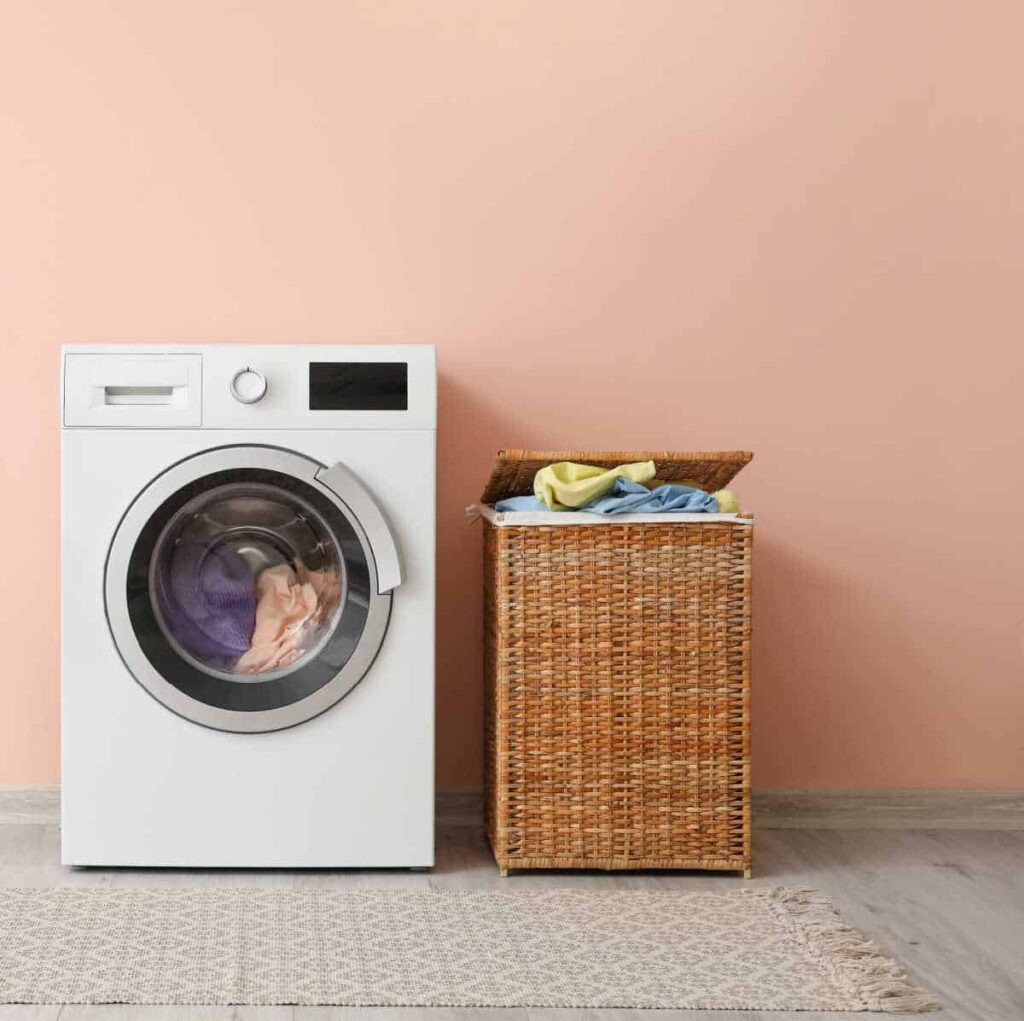
Something I was wholly unprepared for as a new parent was the amount of laundry a new baby creates. It’s a lot.
Reducing the amount of washing you need to do is hard to do with a new baby in tow. However, there are steps you can take to lighten the environmental impact of all that washing. Things you can do to be a green parent include:
- Fully loading the washing machine instead of running several small loads a day.
- Wash at low temperatures (30ºC or lower where possible – except when washing reusable nappies).
- Dry outside or dry indoors, where possible, rather than using your tumble dryer.
- Opting for eco-friendly laundry detergent where possible to avoid water pollution.
- Ditching the fabric conditioner for an eco-friendly alternative.
5. Try Green Cleaning
Another thing I was unprepared for as a new parent was the increase in the amount of cleaning we had to do. Kids are mucky pups, especially as you reach the weaning stage. Suddenly you find yourself wondering just how exactly Weetabix got on your wall or jam ended up on your curtains. It happens to us all!
Lots of conventional cleaning products contain harsh chemicals that aren’t good for you, your kids or the environment. To avoid these harmful ingredients, look for eco-friendly cleaning products that clean effectively whilst being kind to you and the planet.
Better yet, consider making your own cleaning products. I’ve got heaps of recipes for effective household cleaners that I’ve developed over the years. These are made from common food-safe and non-toxic ingredients, including vinegar, bicarbonate of soda, lemon juice, and citric acid. These clean just as effectively as conventional cleaners, without the nasties. Plus they’re generally much cheaper than shop-bought products.
6. Try Swapping To Sustainable Baby Products
Kid’s toiletries tend to be awash with chemicals and plastic. Johnson & Johnson, for example, has been hit with a slew of lawsuits linking its baby powder to cancer.
Instead, selecting natural products, where possible can be a better choice for both your baby and the environment. Whether you DIY some nappy rash cream or swap to natural and organic baby shampoo these are all positive green parenting choices you can make.
7. Ditch The Car Where Possible
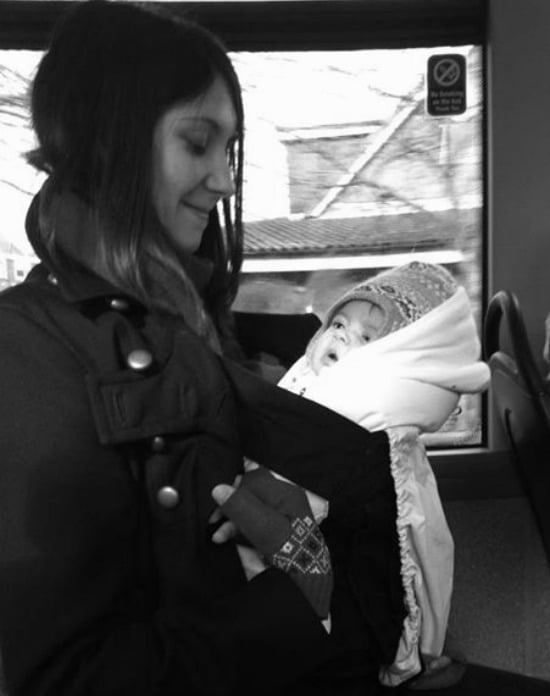
Another green parenting tip is to try to use public transport or walk where possible, rather than using the car. Granted, depending on where you live it may not be easy or a choice open to you at all, so you do what works for you.
Personally, I do try to use the bus where possible. Kids are fairly portable. Up until the age of 18 months, I predominantly used our Ergobaby carrier to get about. I would say any kind of carrier is absolutely invaluable if you travel mainly on buses or trains.
With baby carriers or slings, you can go anywhere and don’t have to worry about there not being a space on the bus or train for your pram. As my daughters got older and were mostly walking, but still at the stage of needing a daytime nap, I swapped to a small umbrella buggy (bought secondhand!) that folded up at the flick of a lever for quick and easy bus access.
As a new parent, I have also appreciated the social aspect of using public transport. I have made some really good friends on the bus that I wouldn’t have met whilst travelling alone in a car.
8. Eat Less Meat
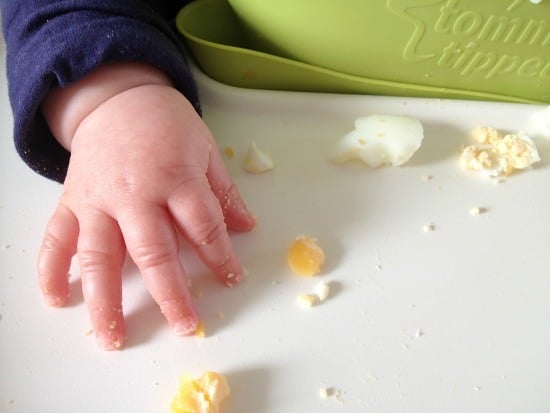
Another top tip is to eat less meat if you can. A recent study by researchers at Leeds University found that one of the six key ways individuals could help to keep global heating down to 1.5ºC is to eat a largely plant-based diet.
My partner and I are both long-term vegetarians. Whilst we’re not exclusively vegan, we do try to eat fewer dairy products. This means opting for vegan stews, soups, chillis, vegetable pasta, dahls, and curries for many of our meals, and drinking oat milk.
To help us out, we’re heavily into our slow cooker. One of us can pop the ingredients in the slow cooker in the morning and switch it on. By dinner time, a delicious home-cooked meal is ready for us. It’s been life-changing. Here are some great vegan and vegetarian slow cooker recipes to try.
Whilst vegetarianism works for us, it might not be for everyone. If you don’t want to go vegetarian, then cutting down on the number of days that you eat meat is a good approach. The Meat Free Monday Twitter stream always has some good recipe suggestions if you’re struggling with ideas.
9. Embrace Your Local Library
Instead of purchasing new books, a good tip is to explore the vast collection of children’s literature at your local library. Borrowing books means you can read a whole host of stories to your child, without accumulating a mountain of titles at home. This can save a lot of resources, whilst saving you a whole lot of money.
Many libraries also offer free storytelling sessions, kid’s workshops, and even toy-borrowing services, making it well worth your while getting to know your local library.
10. Try Toy Swapping
Finally, it’s easy to be overwhelmed by the sheer volume of toys you’ll receive in the first year of your baby’s life alone. Instead of buying toys for your kids, you could try to arrange a toy swap with friends with kids of a similar age. That way you’ll always have fresh toys for your kids to play with, without all the clutter and waste that goes along with owning toys.
Alternatively, you could try a toy subscription service like Whirli. Here you can buy tokens you can use to borrow toys, and then your kids can play with them for as long as they like. When the toy falls out of favour (as all toys invariably do), you can then return it to Whirli and swap it for something else. It’s a sustainable and circular approach to toys that I love.
To Sum Up
Starting out on your green parenting journey can feel like a maze, packed full of judgement at every turn. However, by taking small, meaningful steps – from embracing the joy of preloved items to considering reusable products and considering tweaks to your lifestyle, such as embracing public transport and reducing meat consumption – you can make positive environmental changes that benefit you and the planet.
Just remember that parenting is a unique journey for every family. Whatever choices you make should reflect what works best for you and your baby.
If you have any more green parenting tips then please do share in the comments below! And if you have older kids, if have lots of useful resources:
- How to talk about climate change to kids
- My top environmental websites for children
- Eco-friendly party bag filler ideas – to help stem the torrent of plastic!
Found this post useful? Please consider buying me a virtual coffee to help support the site’s running costs.

